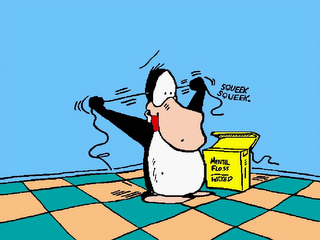This I Believe
This week we've been set to articulate belief, an opportunity rarely afforded to most journalists. These things are left to the editorial pages, and in my humble opinion even those lack in any real human emotion. Because editorials are, ideally, still a form of journalism.
But NPR, in all its brilliance, allows listeners to contribute their beliefs, without the underlying idea that this should be based on the news or any research. Just beliefs.
This was fun to write, but also difficult. There were aspects of the story left out that I wish I could include, as well as anecdotes and other characters. but in the spirit of NPR's This I Believe I'm keeping it short.
So here is my own contribution about my experiences at the Seattle Public Library. Listen to it at the following link, or if you prefer, read it below.
Music and libraries
My parents regularly encouraged me to focus my interests on something more career oriented. But in high school and through my undergraduate education, despite getting a “practical” degree in psychology, I subconsciously decided that I really to learn about the history music.
I sought this education outside of the traditional methods, and since I did not have the financial ability to acquire music at a rate to keep my hunger satisfied, I turned to the library, an educational sanctuary from my large, chaotic family crammed into a small house.
At the library my fingers endlessly flipped through CDs and records, scanning names that I loved, names that I recognized but never heard and hopefully the unusual gem that catches my eye and somehow leads me to a musical realm I could not imagine.
A man in his mid-thirties worked at our local library, and became a close ally in my effort to absorb every possible kind of sound. It started at first as he scanned through my stack of 10 to 20 CDs and LPs occasionally pausing and letting out a small inquisitive grunt or hum.
But soon the pauses turned to conversations, questions and recommendations. As I leafed through Miles Davis, The Beatles and Elvis Costello, he slowly guided me towards John Coltrane, The Zombies, and Television.
Soon after I did not look forward to the albums I would bring home, but the brief conversations I would have with the pony-tailed librarian. I started spending more and more time at the library; on the occasional week I would go there every day.
Many times I would keep my interests secret, hoping that the selection of a Charles Mingus or Eric Dolphy album would impress him. I wanted to prove to him that not only did I take his recommendations, but also expanded on them.
Unconscious of both of us, I became his student, and he became my teacher, with little more than a few minutes of conversation every couple of days. I had found someone who took my interest seriously, and encouraged it to grow. But what I learned from him was more than music. He sparked a small scholarly impetus deep inside me that lives with me today.
I believe in education, but not the kind that you find in a school building. It’s not the kind that can be tested or lead to some qualification or career. It’s the kind of education motivated merely by the desire to know more. I believe in the kind of education that has a teacher and a student, but no program.
I sought that education, and with the help of a man who’s name I never knew, I found it. I hope one day to be a teacher too, just like the one I had.

 I remember when I was younger when I wanted to find out information, I flipped through the pages of an encyclopedia. Research began with my fingers gliding across the row of dark green books with gold embossing that sat on my family’s bookshelves. If I was writing a paper on Zimbabwe, I looked in the “XY & Z” volume of our encyclopedia set, using the information as a springboard for the rest of my research. As I got older, and my school assignments demanded a little more, I realized the limitation of the dictionaries.
I remember when I was younger when I wanted to find out information, I flipped through the pages of an encyclopedia. Research began with my fingers gliding across the row of dark green books with gold embossing that sat on my family’s bookshelves. If I was writing a paper on Zimbabwe, I looked in the “XY & Z” volume of our encyclopedia set, using the information as a springboard for the rest of my research. As I got older, and my school assignments demanded a little more, I realized the limitation of the dictionaries.
